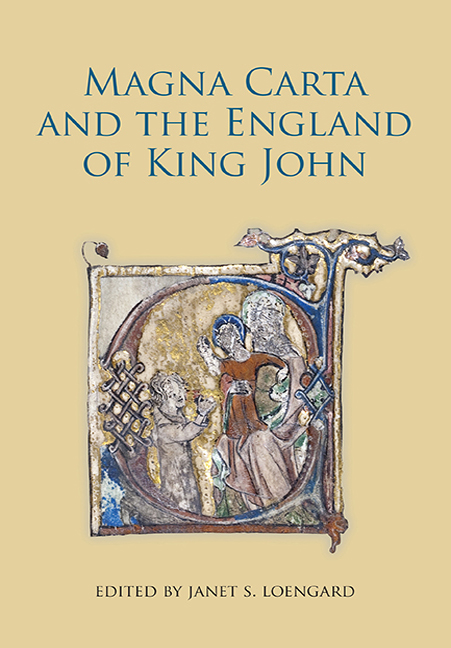Book contents
- Frontmatter
- Contents
- List of Contributors
- List of Abbreviations
- Introduction
- England in 1215: An Authoritarian Angevin Dynasty Facing Multiple Threats
- The Anonymous of Béthune, King John and Magna Carta
- Baronial Paranoia in King John's Reign
- The Forest Eyre in the Reign of King John
- The Managerial Revolution in the English Church
- Magna Carta, the ius commune, and English Common Law
- Justice without Judgment: Criminal Prosecution before Magna Carta
- What Did Magna Carta Mean to Widows?
- The English Economy in the Age of Magna Carta
- The Complaint of King John against William de Briouze (c. September 1210)
- Index
The Complaint of King John against William de Briouze (c. September 1210)
Published online by Cambridge University Press: 28 April 2017
- Frontmatter
- Contents
- List of Contributors
- List of Abbreviations
- Introduction
- England in 1215: An Authoritarian Angevin Dynasty Facing Multiple Threats
- The Anonymous of Béthune, King John and Magna Carta
- Baronial Paranoia in King John's Reign
- The Forest Eyre in the Reign of King John
- The Managerial Revolution in the English Church
- Magna Carta, the ius commune, and English Common Law
- Justice without Judgment: Criminal Prosecution before Magna Carta
- What Did Magna Carta Mean to Widows?
- The English Economy in the Age of Magna Carta
- The Complaint of King John against William de Briouze (c. September 1210)
- Index
Summary
In the immediate aftermath of William de Briouze's flight to France in 1210, King John dictated this document in council to establish his side of the case in his actions against Briouze. Such documents (querimoniae) are not common in medieval society, but there are some other famous examples. One of the earliest is the recital c. 940 AD by King Æthelstan of England of the troubled relationship between himself and his murderous brother Alfred. The original was once to be seen at Malmesbury Abbey, and was copied there around 1126 by the abbey's historian, William, but is now lost. More famous is the ‘Conventum’ published by Hugh le Brun of Lusignan against his overlord, Count William of Poitiers, around 1030. Querimoniae are always important documents as they give remarkable insights into medieval motivation and world view.
Naturally King John's version of the Briouze affair puts the king in a good light. From the opening address it seems it was intended to be published widely throughout England to counter any suggestion that the king had acted unjustly in his persecution of William. The fact that it was published at all indicates that the king expected criticism from the political community and wanted to head it off. The copy we have here was entered in one of the Exchequer registers in the later thirteenth century from an earlier copy which seems to have been damaged, in that the copyist believed that the opening initial was ‘H’ though the document could only have been issued by John. The draft has to have been drawn up not long after the king's return from his successful Irish campaign at the end of August 1210. Its last datable event is John's court at Bristol, where he was September 1210. It was clearly also drawn up before the tragic deaths of members of the Briouze family in Windsor Castle (to which they were transferred from Bristol) before the end of the year, and its most likely time of issue was in the immediate aftermath of the flight to France of William de Briouze and the imprisonment of his wife and many of his family. The document has been discussed several times by historians of John's reign, though not up till now offered in a critical edition.
- Type
- Chapter
- Information
- Magna Carta and the England of King John , pp. 168 - 180Publisher: Boydell & BrewerPrint publication year: 2010



